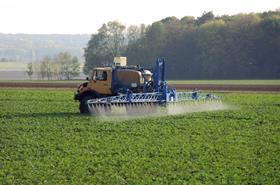
When the head of the planet’s largest pesticide manufacturer says the world is likely to face food shortages within 20 years if pesticides and genetically modified crops are rejected, it is only natural to at least question his motives for saying it.
The crop protection sector has been coming under growing pressure as studies emerge on the negative impact pesticides can have on wildlife and soil health. In Novemeber last year the European Union voted to reauthorise controversial weedkiller glyphosate for a shorter renewal period of five years following a report from the World Health Organisation’s cancer agency that concluded it was “probably carcinogenic to humans”. Then, in April, the EU banned neonicotinoid insecticides to protect both wild and honeybees, which are key to crop pollination.
In an interview with The Guardian, Syngenta’s chief executive J Erik Fyrwald was challenged on whether he believed pesticides were necessary for food production, despite recent studies, also reported in The Guardian that concluded the opposite. These include a UN study that says it is a myth that pesticides are needed to feed the world; a French report which concluded that many farmers could use less pesticides without losses; and warnings from a Defra adviser that it isn’t safe to use pesticides on an industrial scale.
Fyrwald’s argument is that technologies to produce as much crop from as little land as possible are crucial in combating climate change, and that more targeted application will ensure farmers around the world use less pesticide in future.
Adam Speed of industry body the Crop Protection Association reiterates Syngenta’s position that modern pesticides, along with plant breeding and other technologies, will be “crucial in meeting national and international demands for safe food”, however he also stresses that reducing the environmental impact of crop protection products is “an aim shared by industry and something our members dedicate considerable time and resources to.”
Speed challenges the “assumption” that pesticides cause environmental harm as “misleading and overly simplistic”. “Direct application of pesticides on land set aside for conservation can help ensure that land is properly managed to provide maximum benefit,” he argues. “Some of the best examples of conservation farming in the UK take a conventional approach, both to growing crops and to managing land for biodiversity and the environment.”
Looking beyond Britain’s shores, there are concerns that some fresh produce imports to the UK from outside the EU may have to be cut in the next two years if EU MRLs are deleted or certain pesticides don’t have their EU approval renewed under the bloc’s new hazard-based (rather than risk-based) system. A report by consultancy Audax warned that the availability of some crops could be at risk due to an inability to meet new EU legislative criteria. These include citrus, peaches, mangoes, table grapes, beans, peas and peppers.
Conventional growers in the UK will have welcomed AHDB’s recent approval of a raft of short-term 120-day authorisations to combat late blight, aphids, spotted wing drosophila and a range of weeds.AHDB’s crop protection team coordinated the applications following serious concerns over available control options raised by growers. Five emergency authorisations – for Afalon, Teppeki, Tracer, Cuprokylt and Exirel 10 SE – have been granted to tackle pests in crops ranging from salad to soft fruit to root vegetables.
Many growers will be hoping that products like these remain available in the longer term as Britain prepares to regulate its own use of pesticides outside the EU. But the jury is still out on how much these chemicals are really needed for fruit and vegetable production, and the true extent of their impact on wildlife and the environment.






No comments yet